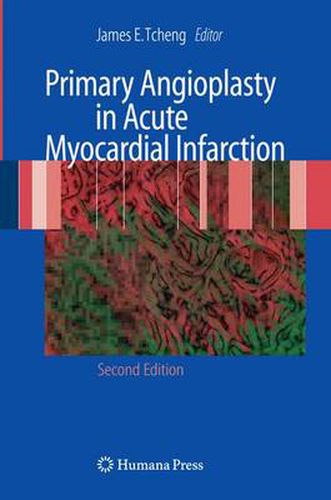Readings Newsletter
Become a Readings Member to make your shopping experience even easier.
Sign in or sign up for free!
You’re not far away from qualifying for FREE standard shipping within Australia
You’ve qualified for FREE standard shipping within Australia
The cart is loading…






This title is printed to order. This book may have been self-published. If so, we cannot guarantee the quality of the content. In the main most books will have gone through the editing process however some may not. We therefore suggest that you be aware of this before ordering this book. If in doubt check either the author or publisher’s details as we are unable to accept any returns unless they are faulty. Please contact us if you have any questions.
The past 50 years have witnessed a breathtaking evolution in the approaches to the patient with an acute ST elevation myocardial infarction. In the 1960s, the now commonplace cardiac intensive care unit was but a nascent idea. Without much to offer the patient but weeks of absolute bedrest, substantial morbidity and high rates of mortality were the norm. Just 30 years ago, seminal discoveries by DeWood and colleagues suggested that the culprit was plaque rupture with thrombosis, not progressive luminal compromise. Subsequent fibrinolyt- based strategies resulted in a halving of the mortality of acute myocardial infarction. With the introduction of balloon angioplasty in the late 1970s, a few interventional cardiologists braved the question: why not perform emergency angioplasty as a primary reperfusion strategy? Indeed, reports of successful reperfusion via balloon angioplasty appeared (mostly in local newspapers) as early as 1980. Despite being thought of as heretical by mainstream cardiology, these pioneers nonetheless persevered, proving the benefit of “state-of-the-art” balloon angioplasty compared with “state-of-t- art” thrombolytic therapy in a series of landmark trials published in the New England Journal of Medicine in March of 1993. Publication of the first edition of Primary Angioplasty in Acute Myocardial Infarction in 2002 to some extent anticipated the widespread acceptance of primary percutaneous coronary intervention as the standard of care. Since then, in all respects, the evolution of emergency percutaneous revascularization has only accelerated. The universal replacement of balloon angioplasty with stent implantation was clearly one key.
$9.00 standard shipping within Australia
FREE standard shipping within Australia for orders over $100.00
Express & International shipping calculated at checkout
This title is printed to order. This book may have been self-published. If so, we cannot guarantee the quality of the content. In the main most books will have gone through the editing process however some may not. We therefore suggest that you be aware of this before ordering this book. If in doubt check either the author or publisher’s details as we are unable to accept any returns unless they are faulty. Please contact us if you have any questions.
The past 50 years have witnessed a breathtaking evolution in the approaches to the patient with an acute ST elevation myocardial infarction. In the 1960s, the now commonplace cardiac intensive care unit was but a nascent idea. Without much to offer the patient but weeks of absolute bedrest, substantial morbidity and high rates of mortality were the norm. Just 30 years ago, seminal discoveries by DeWood and colleagues suggested that the culprit was plaque rupture with thrombosis, not progressive luminal compromise. Subsequent fibrinolyt- based strategies resulted in a halving of the mortality of acute myocardial infarction. With the introduction of balloon angioplasty in the late 1970s, a few interventional cardiologists braved the question: why not perform emergency angioplasty as a primary reperfusion strategy? Indeed, reports of successful reperfusion via balloon angioplasty appeared (mostly in local newspapers) as early as 1980. Despite being thought of as heretical by mainstream cardiology, these pioneers nonetheless persevered, proving the benefit of “state-of-the-art” balloon angioplasty compared with “state-of-t- art” thrombolytic therapy in a series of landmark trials published in the New England Journal of Medicine in March of 1993. Publication of the first edition of Primary Angioplasty in Acute Myocardial Infarction in 2002 to some extent anticipated the widespread acceptance of primary percutaneous coronary intervention as the standard of care. Since then, in all respects, the evolution of emergency percutaneous revascularization has only accelerated. The universal replacement of balloon angioplasty with stent implantation was clearly one key.